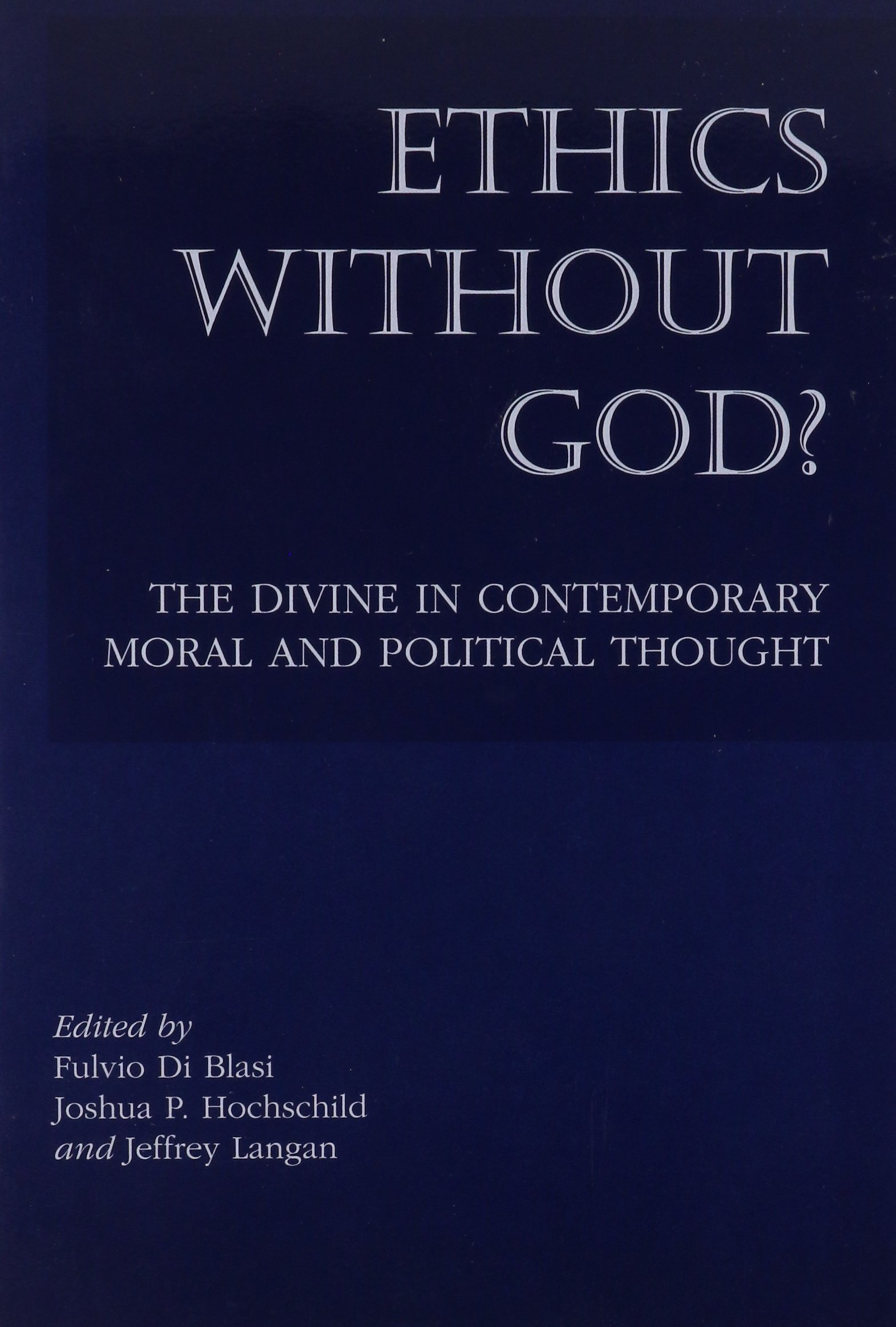Scholarship
From first principles to practical implications, and all points in between.
In medieval logic, my major focus has been on analogy as an intersection of logical and metaphysical first principles. Work here includes a book about Cajetan’s De Nominum Analogia, and articles on analogy in Aquinas. The semantic issues have extended to articles on cognition as “mental language” and a translation of Claude Panaccio’s book on the pre-modern history of that notion, as well as to articles on the relation of logic and theology, and clarification of basic metaphysical principles. Current projects include research on unpublished manuscripts on analogy by Yves Simon and Mortimer Adler.
In ethics, my focus has been on the relation of the Thomistic tradition to modern thought. This includes two co-edited volumes on the neglected theological dimension of “virtue ethics,” and various articles on natural law and Catholic social thought. It also has led to reflection on modernity’s changing rhetoric of teleology and virtue, including articles on David Hume, John Henry Newman, Wendell Berry, the origin of the idea of “the meaning of life,” among other topics. Current projects in practical philosophy include drawing from the revival of interest in phronesis in psychology and the social sciences to highlight the role of uncertainty and ignorance in prudential judgment.
Scholarship aims to join and advance a larger conversation. At or between the two poles of first principles and practical application, I seek to engage the most influential ideas of the past and the best ideas of present to continue fruitful conversation into the future. I’ve been gratified to see my work cited not only by other philosophers but in such disciplines as economics, theology, and political theory and policy.
BOOKS
The Semantics of Analogy
Rereading Cajetan’s De Nominum Analogia
University of Notre Dame Press, 2010.
Virtue’s End
God in the Moral Philosophy of Aristotle and Aquinas
Co-edited with Fulvio Di Blasi and Jeffrey Langan, St. Augustine’s Press, 2008.
Ethics without God?
The Divine in Contemporary Moral and Political Thought
Co-edited with Fulvio Di Blasi and Jeffrey Langan, St. Augustine’s Press, 2008.
Mental Language
From Plato to William of Ockham, by Claude Panaccio
Translated from the French, with Meredith K. Ziebart, Fordham University Press, 2017.
Metaphysics through Semantics
The Philosophical Recovery of the Medieval Mind: Essays in Honor of Gyula Klima
Edited, with Adam Wood, Turner Nevitt, and Gábor Borbély, Springer, 2023.
ARTICLES & REVIEWS
Linked online where available. Feel free to contact author where links don’t work or are not available.
MEDIEVAL LOGIC & METAPHYSICS
“‘Real Presence’ Is Not Enough: Reclaiming the Lost Semantics of ‘Transubstantiation,’” in Gyula Klima, ed., The Metaphysics and Theology of the Eucharist: A Historical-Analytical Survey of the Problems of the Sacrament (Springer, 2024), pp. 433-454.
“In Appreciation of Gyula Klima,” in Joshua P. Hochschild, Turner C. Nevitt, Adam Wood and Gábor Borbély, eds., Metaphysics Through Semantics: The Philosophical Recovery of the Medieval Mind — Essays in Honor of Gyula Klima (Springer, 2023), pp. xiii-xxii.
“On the Unpublished Analogy Manuscripts of Yves Simon and Mortimer Adler,” in Doctor Communis 5: San Tommaso e l’Analogia / Saint Thomas and Analogy (2023; Acts of the 20th Plenary Session of the Pontifical Academy of Saint Thomas Aquinas, 2021), Serge-Thomas Bonino and Guido Mazzotta (eds.), 243-260.
“Magister Ludi: Thomas Aquinas and the Role of Logic in Theology,” Hungarian Philosophical Review / Magyar Filozófiai Szemle 64.4 (2020): 43-62.
Review of: John F. X. Knasas, Thomistic Existentialism and Cosmological Reasoning (Catholic University of America Press, 2019), The Thomist 84 (2020): 168-172.
“Aquinas’s Two Concepts of Analogy and a Complex Semantics for Naming the Simple God,” The Thomist 83.2 (April 2019): 155-184.
“Cajetan’s ‘On the Analogy of Names,’” in Benjamin Hill, Henrik Lagerlund and Robert Stainton, eds., Sourcebook in the History of Philosophy of Language (Springer, 2017), pp. 419-420.
“Mental Language in Aquinas?” in Gyula Klima, ed., Intentionality, Cognition and Mental Representation in Medieval Philosophy (Fordham University Press, 2015), pp. 19-45.
“Substance Made Manifest: Metaphysical and Semantic Implications of the Doctrine of Transubstantiation,” Saint Anselm Journal 9.2 (Spring 2014).
“Proportionality and Divine Naming: Did St. Thomas Change His Mind about Analogy?” The Thomist 77.4 (2013): 531-558.
“Form, Essence, Soul: Distinguishing Principles of Thomistic Metaphysics,” in Nikolaj Zunic, ed., Distinctions of Being: Philosophical Approaches to Reality (American Maritain Association/Catholic University of America Press, 2013), pp. 21-35.
“Cajetan on Scotus on Univocity,” Proceedings of the Society for Medieval Logic and Metaphysics 7 (2007): 32-42. (Republished in: Medieval Metaphysics, or is it “Just Semantics,” ed. Gyula Klima and Alex W. Hall [Cambridge Scholars Press, 2011]: 41-54.)
“Kenny and Aquinas on Individual Essences,” Proceedings of the Society for Medieval Logic and Metaphysics 6 (2006): 45-56. (Republished in: Medieval Scepticism and the Claim to Metaphysical Knowledge, ed. Gyula Klima and Alex W. Hall [Cambridge Scholars Press, 2011]: 63-78.)
Review of: Bernard Montagnes, The Doctrine of the Analogy of Being according to Saint Thomas Aquinas, trans. E. M. Macierowski (Marquette University Press, 2004), in The Thomist 72 (2008): 336-339.
“The Rest of Cajetan’s Analogy Theory: De Nominum Analogia chapters 4-11,” International Philosophical Quarterly 45 (2005): 341-356.
“Cajetan, Cardinal,” in Donald M. Borchert, ed., Encyclopedia of Philosophy, Second Edition (MacMillan, 2005), vol. 2, pp. 6-7.
“Does Mental Language Imply Mental Representationalism? The Case of Aquinas’s Verbum Mentis,” Proceedings of the Society for Medieval Logic and Metaphysics 4 (2004): 12-17. (Republished in: Mental Representation, ed. Gyula Klima and Alex W. Hall [Cambridge Scholars Press, 2011]:17-24.)
“George Berkeley and a Theory of Analogy,” Downside Review 122 (2004): 157-168.
Review of: Jack Zupko, John Buridan: Portrait of a Fourteenth-Century Arts Master (University of Notre Dame Press, 2003), in Journal of the History of Philosophy 42 (2004): 219-220.
“Analogy, Semantics, and Hermeneutics: The ‘Concept vs. Judgment’ Critique of Cajetan’s De Nominum Analogia,” Medieval Philosophy and Theology 11 (2003): 241-260.
“Did Aquinas Answer Cajetan’s Question? Aquinas’s Semantic Rules for Analogy and the Interpretation of De Nominum Analogia,” Proceedings of the American Catholic Philosophical Association 77 (2003): 273-288.
“Logic or Metaphysics in Cajetan’s Theory of Analogy: Can Extrinsic Denomination be a Semantic Property?” Proceedings of the Society for Medieval Logic and Metaphysics 1 (2001): 45-69. (Republished in: The Immateriality of the Human Mind, The Semantics of Analogy, and the Conceivability of God, ed. Gyula Klima and Alex W. Hall [Cambridge Scholars Press, 2011]: 61-92.)
“Words, Concepts, and Things: Cajetan on the Subject of the Categories,” Dionysius 19 (2001): 159-166.
“A Note on Cajetan’s Theological Semantics,” Sapientia 54 (1999): 367-376.
ETHICS & SOCIAL THEORY
“Living Well without Knowledge: Uncertainty in the Moral Philosophy of Thomas Aquinas,” Revista Portuguesa de Filosofia 79.1-2 (2023): 405-428.
“Alasdair MacIntyre’s Service to Theology,” Church Life Journal: A Journal of the McGrath Institute for Church Life (September 25, 2023).
“Magisterial Authority and Theological Authorship: The Harm of Plagiarism in the Practice of Theology” (co-authored with Michael Dougherty), Horizons: The Journal of the College Theology Society 48 (2022): 404-455.
“John Paul II’s Gamble with ‘the Meaning of Life’,” Studia Gilsoniana 10.3 (2021): 491-515.
“Practical Wisdom and the Literary Imagination: Wendell Berry, C. S. Lewis, and the Promise and Limits of Social Theory,” Perspectives in Religious Studies 48.1 (Spring 2021): 15-30.
“Piety without Metaphysics: The Moral Pedagogy of Hume’s Dialogues Concerning Natural Religion,” Urbaniana University Journal 73.3 (2020): 73-99.
“Love,” special issue of the Journal of Moral Theology (Vol. 1, No. 2), co-edited with David Matzko McCarthy (2012).
“How Newman Taught Me Aristotle,” Acta Philosophica 19 (2010): 380-381.
“Natural Law: Thomas Aquinas and the Role of Reason in Social Order,” in David Matzko McCarthy, ed., The Heart of Catholic Social Teaching: Its Origins and Contemporary Significance (Brazos Press, 2009), pp. 113-123.
“Natural Law Argument in a Post-Christian World,” in Fulvio Di Blasi, Joshua P. Hochschild and Jeffrey Langan, eds., Ethics Without God? The Divine in Contemporary Moral and Political Thought (St. Augustine’s Press, 2008), pp. 116-124.
Review of: John M. Rist, What is Truth? From the Academy to the Vatican (Cambridge University Press, 2008), in Journal of the History of Philosophy 48 (2010): 253-254.
“The Re-Imagined Aristotelianism of John Henry Newman,” Modern Age 45 (Fall 2003): 333-342.
“The Principle of Subsidiarity and the Agrarian Ideal,” in Faith, Morality, and Civil Society, ed. Dale McConkey and Peter Augustine Lawler (Lexington Books, 2003), pp. 41-68. Reprinted in Faith and Reason 27 (2002): 117-155.
“Porphyry, Bonaventure and Thomas Aquinas: A Neoplatonic Hierarchy of Virtues and Two Christian Appropriations,” in Medieval Philosophy and the Classical Tradition in Islam, Judaism, and Christianity, ed. John Inglis (Curzon Press, Richmond, Surrey, 2002), pp. 245-259.
Many of these papers are accessible via Academia.com and Philpeople.org. Google Scholar does its best to report citation information.
SELECT SCHOLARLY TALKS
Listed here are select invited scholarly talks at academic events. For some other talks see the page for public engagement, and for a complete list of lectures and academic presentations see my curriculum vitae.
“Alasdair MacIntyre and Philosophical Ethics as a Service to Theology,” Philosophy Society, Edinburgh University, Edinburgh, Scotland, March 9, 2023.
“Truth and the Primacy of Practical Reason: R.G. Collingwood and the Relation of Logic to Metaphysics and Theology,” Blackfriars, Oxford University, Oxford, England, March 6, 2023.
“Living Well Without Knowledge: Uncertainty in the Moral Philosophy of Thomas Aquinas,” Annual Aquinas Lecture, Department of Philosophy, Ave Maria University, Ave Maria, Florida, February 16, 2023.
“Analogy and Ambiguity in Aristotle according to Mortimer Adler,” Society for the European History of Ideas, Lisbon, Portugal, August 1-5, 2022.
“Living Well Without Knowledge: Aquinas on Decision-Making Under Uncertainty,” Symposium Thomisticum, Crakow, Poland, June 3-5, 2022.
“On the Unpublished Analogy Manuscripts of Yves Simon and Mortimer Adler,” San Tommaso e l’analogia / Saint Thomas and Analogy, 20th Plenary Session of the Pontifical Academy of Saint Thomas Aquinas, Rome, December 10-11, 2021.
“Ad Fontes: What Can a Philosophical Association Do?” Presidential Address, 95th Annual Meeting of the American Catholic Philosophical Association, Saint Louis, Missouri, November 19-21, 2021.
“‘Real Presence’ isn’t Enough: Reclaiming the Lost Semantics of ‘Transubstantiation,’” The Metaphysics and Theology of the Eucharist, inaugural conference of the Society for the European History of Ideas, Budapest, Hungary, September 1-4, 2021.
“Logic and Theology in St. Thomas Aquinas,” Symposium Thomisticum, Rome, Italy, July 4-6, 2019.
“How to Abolish Boredom: Philosophical Psychology and the New Evangelization,” invited speaker for Technology and the Human Person, 8th Annual Symposium on Advancing the New Evangelization, Benedictine College, Atchison, Kansas, March 29-30, 2019.
“Divine Naming, Analogy, and the Rest of Aquinas’s Theological Semantics,” Aquinas on Divine Attributes, 8th Annual Philosophy Workshop, Mount St. Mary College, Newburgh, New York, June 14-17, 2018.
“What Aquinas Learned from Aristotle about Analogy,” Symposium Thomisticum, Athens, Greece, June 7-9, 2018.
“Piety without Metaphysics: The Moral Pedagogy of Hume’s Dialogues Concerning Natural Religion,” Symposium Thomisticum, Porto, Portugal, June 22-24, 2017.
“Analogy in Logic, Metaphysics and Theology: Did Aquinas Change His Mind about Proportionality?” Blackfriars Aquinas Seminar, Oxford University, February 7, 2008.
“Speaking across the Boundaries of Being: Did Aquinas Change his Mind about Analogy of Proportionality?” Aquinas Philosophy Lecture, Emory University, Atlanta, Georgia, September 30, 2004.
“The Rest of Cajetan’s Analogy Theory: De Nominum Analogia chapters 4-11,” 15th European Symposium on Medieval Logic and Semantics, Trinity College, Cambridge University, July 1-4, 2004.








